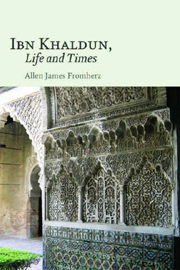1 - HISTORIAN MEETS HISTORY
Published online by Cambridge University Press: 12 September 2012
Summary
… [M]an is not born every day. He was born with a specific historical setting with specific historical priorities.
Carl JungOn January 10, 1401, a world historical figure and a world historian were seated across from each other in a Mongol tent pitched outside the city walls of Damascus, Syria. Ibn Khaldun, one of the greatest historians of all time, and Tamerlane the Conqueror, one of the most powerful, and most vicious, rulers in history, had a civilized discussion about the underlying patterns of human history.
Ibn Khaldun described his visit with Tamerlane in his detailed memoirs, an extraordinarily rich autobiography for the period. Although justifiably afraid of the terrible conqueror, Ibn Khaldun wrote about Tamerlane with the wide-eyed fascination of a scientist who has just discovered a seemingly conclusive piece of evidence that proved a life-long theory. In order to avoid detection by the besieged citizens of Damascus who still refused to surrender, he was lowered over the city walls in the middle of night and made his way to the conqueror's tent. After showing deference to the great Sultan, Ibn Khaldun exclaimed rather cryptically, ‘May God help you sir! It has been today thirty or forty years since I have hoped for this encounter.’
Obviously puzzled and intrigued, since Ibn Khaldun could not have known about him so long ago, Tamerlane asked, ‘For what reason?’
- Type
- Chapter
- Information
- Ibn KhaldunLife and Times, pp. 1 - 38Publisher: Edinburgh University PressPrint publication year: 2010



